Publications
A. Books
Sole Authored and Multi-authored Volumes
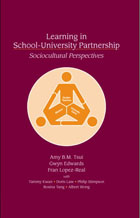
- Tsui, A.B.M., Edwards, G. & Lopez-Real, F. (2009). Learning in School-University Partnership: Sociocultural Perspectives. New York & London: Routledge, Taylor and Francis Group, 200 pp.(with contribution from Kwan, T., Law, D., Stimpson, P., Tang, R., and Wong, A.).
This volume looks at school-university partnerships from sociocultural perspectives of learning that view participation in social practice as fundamental to the process of learning. Its two major themes - school-university partnership, and sociocultural and social theories of learning - have both been treated extensively in the literature. It is the bringing together of these two themes that makes this book unique.
In this examination of an evolving model of school-university partnership, the Unified Professional Development Project in Hong Kong, the authors analyze the learning that takes place as the participants (student teachers, mentor teachers, and university supervisors) mutually engage in the enterprise of improving teaching and learning in schools, developing shared practices, and creating new communities of practice. Although it describes one specific context, the book is not just about this locale. Rather, the Unified Professional Development Project is used as a context for theorizing more generally a social theory of learning for school-university partnerships that is relevant to any other similar context.
This book will interest teacher educators, researchers in teacher education and teacher development, policy makers, and school practitioners who are involved in school-university partnerships.
 Book Reviews
Book Reviews  Purchase from publisher
Purchase from publisher
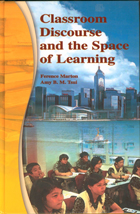
- Marton, F. & Tsui, A.B.M. (2004). Classroom Discourse and the Space of Learning. Mahwah, N.J.: Lawrence Erlbaum Associates, 242pp (with contribution from Chik, P., Ko, P.Y., Lo, M.L., Mok, I., Ng, F.P., Pang, M.F., Pong, W.Y., Runnesson, U.).
Classroom Discourse and the Space of Learning is about learning in schools and the central role of language in learning. The investigations of learning it reports are based on two premises: First, whatever you are trying to learn, there are certain necessary conditions for succeeding--although you cannot be sure that learning will take place when those conditions are met, you can be sure that no learning will occur if they are not. The limits of what is possible to learn is what the authors call "the space of learning." Second, language plays a central role in learning--it does not merely convey meaning, it also creates meaning. The book explicates the necessary conditions for successful learning and employs investigations of classroom discourse data to demonstrate how the space of learning is linguistically constituted in the classroom.
Classroom Discourse and the Space of Learning:
-
makes the case that an understanding of how the space of learning is linguistically constituted in the classroom is best achieved through investigating "classroom discourse" and that finding out what the conditions are for successful learning and bringing them about should be the teacher's primary professional task. Thus, it is fundamentally important for teachers and student teachers to be given opportunities to observe different teachers teaching the same thing, and to analyze and reflect on whether the classroom discourse in which they are engaged maximizes or minimizes the conditions for learning;
- is both more culturally situated and more generalizable than many other studies of learning in schools. Each case of classroom teaching clearly demonstrates how the specific language, culture, and pedagogy molds what is happening in the classroom, yet at the same time it is possible to generalize from these culturally specific examples the necessary conditions that must be met for the development of any specific capability regardless of where the learning is taking place and what other conditions might be present; and
- encompasses both theory and practice--providing a detailed explication of the theory of learning underlying the analyses of classroom teaching reported, along with close analyses of a number of authentic cases of classroom teaching driven by classroom discourse data which have practical relevance for teachers.
Intended for researchers and graduate students in education, teacher educators, and student teachers, Classroom Discourse and the Space of Learning is practice- and content-oriented, theoretical, qualitative, empirical, and focused on language, and links teaching and learning in significant new ways.
 Book Reviews
Book Reviews  Purchase from publisher
Purchase from publisher
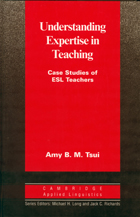
- Tsui, A.B.M. (2003). Understanding Expertise in Teaching. New York: Cambridge University Press, 301 pp.
The author clarifies the nature of expertise in language teaching, its development, and how teachers employ it. This book has provided a major service to the field of applied linguistics in the paperback edition of this first detailed study of what expertise in language teaching consists of and how it develops in language teachers. Exploring the classroom practices of her subjects in four illuminating case studies, the author succeeds in clarifying the nature of expertise in language teaching, the factors that shape and influence its development, and how teachers employ their expertise in teaching. In the process, the author critically examines an extensive literature on teacher cognition and shows how teachers' theories, knowledge, experience, and goals shape their classroom practices and their ability to move from novice to expert. Understanding Expertise in Teaching is a valuable addition to the literature on teacher cognition in language teaching and is of considerable interest to researchers, teachers, and teacher educators in applied linguistics and TESOL.
 Book Reviews
Book Reviews  Purchase from publisher
Purchase from publisher
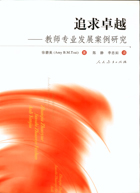
- Tsui, A.B.M. (2003). In Pursuit of Excellence ( 追求卓越 - 教師專業發展案例研究 ) (Chinese Translation of Understanding Expertise in Teaching, with Foreword by Gu Ling Yuan). Beijing: People's Education Press, 326 pp.
對於專家知能 (expertise) 特徵的研究很早就受到認知心理學界的關注,但直至近幾年來,仍然很少有人從課堂教學的角度去展開。本書作者 開創了第二語言教學中的專家知能的研究。通過四個引人入勝並富啟發性的案例,作者探究了教師的課堂實踐和教師的專業知識,揭示了第二語言(英語)教學領域中專家知能的特徵,分析了形成和影響專家知識發展的因素,並闡明了教師如何培養和發展專家知能。作者批判性地檢視了大量有關教師認知的文獻,闡釋了教師的教學理念、專業知識、學科知識、教學經驗、人生經歷 、工作環境及教師的取態如何建構他們的課堂實踐活動以及如何影響一名教師從新手成長為專家, 探明教學領域中專家知能的內涵。本書 說明了理論和研究怎樣啟發我們去理解一個習以為常的事物如教學,同時也促使我們重新思考和認識教師成長的道路。
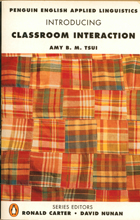
- Tsui, A.B.M. (1995). Introducing Classroom Interaction. London: Penguin, 123 pp.
Introducing Classroom Interaction is an investigation into the complexities of language classroom teaching and learning which will enable teachers to better analyze their own classrooms. The book examines the interaction between teachers and their students and between the students themselves. It will help teachers to develop sensitivity towards the language they use and to analyze student participation and learning. It introduces methods of systemic observation offering guidelines and techniques for analysis. Data from language classrooms is used throughout and there are tasks giving teachers the opportunity to consider the issued raised in the book.
 Book Reviews
Book Reviews
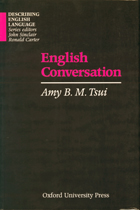
- Tsui, A.B.M. (1994). English Conversation. In Describing English Language Series. London: Oxford University Press, 298 pp.
This book provides a comprehensive description of the functions of conversational utterances in English. Using authentic, naturally-occurring data, the author proposes a descriptive framework for characterizing conversational utterances, organization, and development. In the process, she offers new insights into the sequencing of patterns of interaction. In the final chapter, the author demonstrates how this framework can be applied to the analysis of conversation and outlines aspects of conversational patterning that have yet to be accounted for. This study draws upon insights from several different fields, including speech act theory, ethnomethodology, and discourse analysis, and presents a range of carefully formulated arguments and analyses in an area of great importance to linguistic understanding.
 Book Reviews
Book Reviews
Edited Volumes
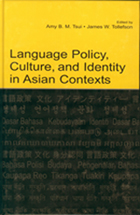
- Tsui, A.B.M. and Tollefson, James (Eds.) (2007). Language Policy, Culture and Identity in Asian Contexts. Mahwah, N.J.: Lawrence Erlbaum Associates, 283 pp.
Bringing together scholarship on issues relating to language, culture, and identity, with a special focus on Asian countries, this volume makes an important contribution in terms of analyzing and demonstrating how language is closely linked with crucial social, political, and economic forces, particularly the tensions between the demands of globalization and local identity. A particular feature is the inclusion of countries that have been under-represented in the research literature, such as Nepal, Bangladesh, Brunei Darussalam, Pakistan, Cambodia, Vietnam, and Korea. The book is organized in three sections:
- Globalization and its Impact on Language Policies, Culture, and Identity;
- Language Policy and the Social (Re)construction of National Cultural Identity; and
- Language Policy and Language Politics: The Role of English.
Unique in its attention to how the domination of English is being addressed in relation to cultural values and identity by non-English speaking countries in a range of sociopolitical contexts, this volume will help readers to understand the impact of globalization on non-English speaking countries, particularly developing countries, which differ significantly from contexts in the West in their cultural orientations and the way identities are being constructed.
Language Policy, Culture, and Identity in Asian Contexts will interest scholars and research students in the areas of language policy, education, sociolinguistics, applied linguistics, and critical linguistics. It can be adopted in graduate and advanced undergraduate courses on language policy, language in society, and language education.
 Book Reviews
Book Reviews  Purchase from publisher
Purchase from publisher
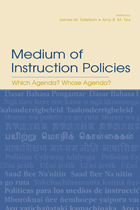
- Tollefson, James and Tsui, A.B.M. (Eds.) (2004). Medium of Instruction Policies: Which Agenda? Whose Agenda? N.J.: Lawrence Erlbaum Associates, 306 pp.
Medium of instruction policies in education have considerable impact not only on the school performance of students and the daily work of teachers, but also on various forms of social and economic (in)equality.
In many multiethnic and multilingual countries, the choice of a language for the medium of instruction in state educational systems raises a fundamental and complex educational question: what combination of instruction in students' native language(s) and in a second language of wider communication will ensure that students gain both effective subject-content education, as well as the second-language skills necessary for higher education and employment? Beyond this educational issue of choice of language(s) of instruction, medium of instruction policies are also linked to a range of important sociopolitical issues, including globalization, migration, labor policy, elite competition, and the distribution of economic resources and political power. The contributors to this volume examine the tension between the educational agendas and other social and political agendas underlying medium of instruction policies in different countries around the world, and unravel the connections between these policies and the related, critically important educational, social, political, and economic issues.
Medium of Instruction Policies: Which Agenda? Whose Agenda? is intended for scholars and specialists in education, language policy, sociolinguistics, applied linguistics, and language teaching, and is intended for use in graduate and advanced undergraduate courses on language education and language policy.
 Book Reviews
Book Reviews  Purchase from publisher
Purchase from publisher
- Bird, N. with Falvey, P., Tsui, A.B.M., Allison, D., & McNeill, A. (Eds.). (1994). Language and Learning, Hong Kong: Institute of Language in Education, Education Department, 551 pp.
- Tsui, A.B.M. & Johnson, I. (Eds.). (1993). Teacher Education and Development. Education Papers No. 18, Faculty of Education, The University of Hong Kong, 177 pp.
B. International Refereed Journal Papers and Book Chapters (since 2000)
- Tsui, A.B.M. (forthcoming). Classroom Discourse. The Encyclopaedia of Language and Education. Revised edition, J. Cenoz & N. H. Hornberger (Eds.) (forthcoming) New York: Springer.
- Tsui, A.B.M. (2016). Leading Transitions: The Case of Undergraduate Education Reform at HKU. In Marshall, S. (Ed.), A Handbook on Leaders in Higher Education: Transforming Teaching and Learning. (pp.129-131). U.K.: Routledge.
- Tsui, A.B.M. (2015). A Response to Land, R. and Gordon, G. (2015) Teaching Excellence Initiatives: Modalities and operational factors. U.K. Higher Education Academy.
- Tollefson, J. W. & Tsui, A.B.M. (2014). Language diversity and language policy in educational access and equity. Review of Research in Education, 38, 189-214.
- Tsui, A.B.M. (2014). English as lingua franca on campus: Cultural integration or segregation? In N. Murray & A. Scarino (Eds.), Dynamic ecologies of languages education in the Asia-Pacific region: Developments, issues and challenges (pp. 75-93). New York: Springer.
- Lam, H.C. & Tsui, A.B.M. (2013). Awareness of orthographic structure in children's learning of Chinese characters. Contemporary Educational Research Quarterly, 21(3), 83-111.
- Lam, H.C. & Tsui, A.B.M. (2013). Drawing on the variation theory to enhance students' learning of Chinese characters.
Instructional Science, 41(5), 955-974.
- Tsui, A.B.M. (2012). Transforming Student Learning: Undergraduate curriculum reform at The University of Hong Kong. In P. Blackmore & C. Kandiko (Eds.), Strategic Curriculum Change: Global Trends in Universities (pp. 62-72). London, U.K.: Routledge.
- Tsui, A.B.M. (2012). Language and Education in Asia. In J. A. Banks (Ed.), Encyclopaedia of Diversity in Education (Vol. 3, pp.1319-1323). USA: Sage.
- Tsui, A.B.M. (2012). The dialectics of theory and practice in teacher knowledge development. In J. Hüttner, B. Mehlmauer-Larcher, S. Reichl & B. Schiftner (Eds.), Theory and Practice in EFL Teacher Education: Bridging the Gap (pp. 16-37). Bristol: Multilingual Matters.
- Tsui, A.B.M. (2012). Ethnography and Classroom Discourse. In J. P. Gee & M. Hanford (Eds.), Routledge Handbook of Discourse Analysis (pp. 383-395). U.K.: Routledge.
- Tsui, A.B.M. (2011). Globalization and linguistic paradoxes: The role of English. In J. L. Bianco & D. Veronique (Eds.), Chapter 7, Institutions and power (D. Divita, Trans.). In Geneviève Zarate, Danielle Lévy, & Claire Kramsch (Eds.), Handbook of Multilingualism and Multiculturalism (pp. 335-338). Paris: Editions des Archives Contemporaines (Contemporary Publishing International SARL). [Reprinted from: Tsui, A. B. M. (2008). Mondialisation et paradoxes linguistiques: Le rôle de l anglais. In J. Lo Bianco & Daniel Veronique (Eds.), Chapiture 7, Institutions et pouvoir, in Geneviève Zarate, Danielle Lévy, & Claire Kramsch (Eds.), Précis du plurilinguisme et du pluriculturalisme (pp. 353-356). Paris: Editions des Archives Contemporaines. (Contemporary Publishing International SARL).]
- Tsui, A.B.M. (2011). Classroom Discourse. In J. Simpson (Ed.), The Routledge Handbook of Applied Linguistics (pp. 274-286). New York & London: Routledge.
- Itakura, H., & Tsui, A.B.M. (2011). Evaluation in Academic Discourse: Managing Criticism in Japanese and English Book Reviews. Journal of Pragmatics, 43(5), 1366-1379.
- Tsui, A.B.M. (2011). Teacher Education and Teacher Development. In E. Hinkel (Ed.), Handbook of Research in Second Language Teaching and Learning (Vol. II, pp. 21-39). New York & London: Routledge.
- Tsui, A.B.M. (2010). Classroom Discourse as a Re-Mediating Source for Foreign Language Learning. In W. M. Chan, K. N. Chin, M. Nagami, T. Suthiwan (Eds.), Media in Foreign Language Teaching and Learning (pp. 109-130). Singapore: Center for Language Studies, Faculty of Arts and Social Sciences, National University of Singapore.
- Tsui, A.B.M., & Ng, M.M.Y. (2010). Cultural Contexts and Situated Possibilities in the Teaching of Second Language Writing. Journal of Teacher Education, 61(4), 364-375.
- Tsui, A.B.M. (2010). Teacher's Professional Learning in School-University Partnership. In D. Boorer, et al. (Eds.), Bridging Worlds: Making Connections in Education: Selected Papers from the 14th International Conference on Education (ICE) 2009. Brunei Darussalam: Universiti Brunei Darussalam.
- Cheng, W., & Tsui, A.B.M. (2009). ‘ahh ((laugh)) well there is no comparison between the two I think’: How do Hong Kong Chinese and native speakers of English disagree with each other?. Journal of Pragmatics, 41(11), 2365-2380.
- Tsui, A.B.M. (2009). Distinctive Qualities of Expert Teachers. Teachers and Teaching: Theory and Practice, 15(4: Special Issue), 421-439.
- Itakura, H., & Tsui, A.B.M. (2009). Criticisms in English and Japanese in Academic Writing. In K. P. Turner & B. Fraser (Eds.), Studies in Pragmatics: Vol. 6: Language in life, and a life in language: Jacob Mey - A Festschrift (pp. 193-202). U.K.: Emerald.
- Tsui, A.B.M. & Wong, J.L.N. (2009). In Search of a Third Space: Teacher Development in Mainland China. In C. K. K. Chan & N. Rao (Eds.), Revisiting the Chinese learner: Changing contexts, changing education (pp. 281-311). Hong Kong: Comparative Education Research Centre/Springer Academic Publishers.
- Tsui, A.B.M. (2009). Teaching Expertise: Approaches, Perspectives and Charaterizations. In A. Burns & J. C. Richards (Eds.), Cambridge Guide to Second Language Teacher Education (pp. 190-197). Cambridge: Cambridge University Press.
- Tsui, A.B.M. (2008). Mondialisation et paradoxes linguistiques: Le rôle de l'anglais [Globalization and linguistic paradoxes: The role of English]. In J. Lo Bianco & Daniel Veronique (Eds.), Chapiture 7, Institutions et pouvoir [Institutions and power], in Geneviève Zarate, Danielle Lévy, & Claire Kramsch, (Eds.) Précis du plurilinguisme et du pluriculturalisme (pp. 353-356). Paris: Editions des Archives Contemporaines. (Contemporary Publishing International SARL).
- Tsui, A.B.M. (2008). Classroom Discourse: Approaches and Perspectives. In J. Cenoz & N. H. Hornberger (Eds.), The Encyclopaedia of Language and Education (Vol. 6: Knowledge About Language, pp. 261-272). New York: Springer.
- Wong, J.L.N. & Tsui, A.B.M. (2007). How do teachers view the effects of school-based in-service learning activities? A case study in China. Journal of Education for Teaching, 33(4), 457-470.
- Tsui, A.B.M. (2007). The Complexities of Identity Formation: A Narrative Inquiry of an EFL Teacher. TESOL Quarterly, 41(4), 657-680.
- Tsui, A.B.M. & Law, D.Y.K. (2007). Learning as Boundary-crossing in School University Partnership. Teaching and Teacher Education, 23(8), 1289-1301.
- Tsui, A.B.M. (2007). Linguistic Paradoxes and Cultural Domination. International Multilingual Research Journal, 1(2), 135-143.
- Tsui, A.B.M. (2007). Instructional Processes in L2 Grammar Teaching. Studies in English Education, 11(2), 147-173.
- Tsui, A.B.M. (2007). Classroom discourse as a semiotic resource for EFL learning. The Language Teacher, 31(7), 13-16.
- Tsui, A.B.M. (2007). Exploring EFL Teacher Identities and Identity Conflicts. In G. Poedjosoedarmo (Ed.), Teacher Education in Language Teaching: RELC Anthology Series 48 (pp. 50-59). Singapore: SEAMEO Regional Language Centre.
- Tsui, A.B.M & Tollefson, J. W. (2007). Language Policy and the Construction of National Cultural Identity. In A.B.M. Tsui & J. W. Tollefson (Eds.), Language Policy, Culture and Identity in Asian Contexts (pp. 1-21). Mahwah, N.J.: Lawrence Erlbaum Associates.
- Tsui, A.B.M. (2007). Language Policy and the Social Construction of Identity: The case of Hong Kong. In A.B.M. Tsui & J. W. Tollefson (Eds.), Language Policy, Culture and Identity in Asian Contexts (pp. 121-141). Mahwah, N.J.: Lawrence Erlbaum Associates.
- Tollefson, J. W. & Tsui, A.B.M. (2007). Issues in Language Policy, Culture and Identity. In A.B.M. Tsui & J. W. Tollefson (Eds.), Language Policy, Culture and Identity in Asian Contexts (pp. 259-270). Mahwah, N.J.: Lawrence Erlbaum Associates.
- Tsui, A.B.M. (2007). What Shapes Teachers’ Professional Development? In J. Cummins & C. Davison (Eds.), International Handbook of English Language Teaching (pp. 1053-1066). Norwell, MA.: Springer.
- Tsui, A.B.M. & Wong, A.T.Y. (2006). Issues in School-University Partnership. In C.K. Lee & M. Williams (Eds.), School Improvement: International Perspectives (pp. 175-192). New York: Nova Science Publishers.
- Tsui, A.B.M. (2005). Plenary: Language policy, culture and identity in the era of globalization. In B. Beaven (Ed.), IATEFL 2005 Conference Selections (pp. 41-51). Canterbury: IATEFL.
- Tsui, A.B.M. (2005). ESL Teachers' Questions and Corpus Evidence. International Journal of Corpus Linguistics, 10(3), 335-356.
- Tsui, A.B.M. (2005). Expertise in Teaching: Perspectives and Issues. In Keith Johnson (Ed.), Expertise in Second Language Learning and Teaching (pp. 167-189). New York: Palgrave Macmillan.
- Sallili, F. & Tsui, A.B.M. (2005). The Effects of Medium of Instruction on Students’ Motivation and Learning. In Rumjahn Hoosain & Farideh Salili (Eds.), Language in Multicultural Education (pp. 135-156). Research in Multicultural Education and International Perspectives, Volume 4. Greenwich CT: Information Age Publishing (IAP).
- Tsui, A.B.M. & Ki, Wing Wah (2004). Language and Learning. In Wing Wah Ki (Ed.), Learning and Theory of Variation《變易理論與學習空間》(in Chinese) (pp. 33-50). Hong Kong: Hong Kong University Press.
- Tsui, A.B.M. (2004). Language Policies in Asian Countries: Issues and Tensions. The Journal of Asia TEFL, Vol. 1, No. 2, Autumn 2004, 1-25.
- Tsui, A.B.M. (2004). Ruhe zuo anli yanjiu《如何開展案例研究》(Conducting Case Studies). In Jiaoyu Fazhan Yanjiu 《教育發展研究》(Exploring Educational Development), 2004 Volume, Issue No. 2, pp. 9-13. Reproduced in Zhongguo Renmin Daxue Shubao Ziliao Zhongxin: Fuyin Baokan Ziliao Jiaoyu Xue《教育學》(Information center for social sciences, RUC. education), 2004 Volume, Issue No. 5, pp. 91-94.
- Tsui, A.B.M. (2004). What Teachers Have Always Wanted to Know - and how corpora can help. In John Sinclair (Ed.), How to Use Corpora in Language Teaching (pp. 39-61). Amsterdam/Philadelphia: John Benjamins, B.V.
- Tsui, A.B.M. (2004). What linguistic descriptions have to say about discourse? In K. Aijmer & J. Allwood (Eds.), Dialogue Analysis VIII: Understanding and Misunderstanding in Dialogue (pp. 25-46). Niemeyer: Tübingen.
- Tsui, A.B.M. & Tollefson, J. W.(2004). The Centrality of Medium of Instruction Policy in Sociopolitical Processes. In J. W. Tollefson & A.B.M. Tsui (Eds.), Medium of Instruction Policies: Which agenda? Whose agenda? (pp. 1-20). Mahwah, N.J.: Lawrence Erlbaum Associates.
- Tsui, A.B.M. (2004). Medium of Instruction in Hong Kong: One Country, Two Systems, Whose Language? In J. W. Tollefson & A.B.M. Tsui (Eds.), Medium of Instruction Policies: Which agenda? Whose agenda? (pp. 97-106). Mahwah, N.J.: Lawrence Erlbaum Associates.
- Tollefson, J. W. & Tsui, A.B.M. (2004). Contexts of Medium-of-Instruction Policy. In J. W. Tollefson & A.B.M. Tsui (Eds.), Medium of Instruction Policies: Which Agenda? Whose Agenda? (pp. 283-294). Mahwah, N.J.: Lawrence Erlbaum Associates.
- Itakura, H. & Tsui, A.B.M. (2004). Gender and Conversational Dominance in Japanese Conversation. Language in Society, Vol. 33, No. 2, 223-248.
- Tsui, A.B.M. (2002). The Semantic Space of Learning. In F. Marton & P. Morris (Eds.), What matters? Discovering critical conditions of classroom learning (pp. 113-132). Göteborg: Acta Universitatis Gothoburgensis.
- Mok, I., Runesson U., Tsui, A.B.M., Wong, S.Y., Chik, P., & Pow, S. (2002). Questions and Variation. In F. Marton & P. Morris (Eds.), What matters? Discovering critical conditions of classroom learning (pp. 75-92). Göteborg: Acta Universitatis Gothoburgensis.
- Tsui, A.B.M. & W.W. Ki (2002). Socio-Psychological Dimensions of Teacher Participation in Computer Conferencing. Information Technology for Teacher Education, Vol. 11, No. 1, 23-44.
- Bunton, D. & Tsui, A.B.M. (2002). Setting Language Benchmarks: Whose benchmark? Journal of Asian Pacific Communication, Vol. 12, No. 1, 63-76
- Tsui, A.B.M. & Andrews, S. (2002). Setting Standards and Language Variation: A dilemma for language education. Journal of Asian Pacific Communication, Vol. 12, No. 1, 1-12.
- Tsui, A.B.M. (2002). On-line and Off-line Communities. Information Technology, Education and Society, Vol. 2, No. 2, 1-13.
- Tsui, A.B.M., Lopez-Real, F., Law, Y.K., Tang, R., Shum, M.S.K. (2001). Roles and Relationships in Tripartite Supervisory Conferencing Processes. Journal of Curriculum and Supervision, Vol. 16, No. 4 (Summer), 322-344.
- Ng, D., Tsui, A.B.M., & Marton, F. (2001). Two Faces of the Reed Relay. In D. Watkins & J. Biggs (Eds.), Teaching the Chinese Learner (pp. 135-160). Hong Kong: CERC, The University of Hong Kong.
- Tsui, A.B.M. (2001). Maximizing Computer Mediated Communication as a Collaborative Learning Environment for ESL Teachers. In B. Morrison, D. Gardner, K. Keobke & M. Spratt (Eds.), ELT Perspectives on IT & Multimedia (pp. 43-68). Hong Kong: English Language Centre, Polytechnic University.
- Tsui, A.B.M. (2001). Classroom Interaction Research, In R. Carter & D. Nunan (Ed.), TESOL Guide. New York: Cambridge University Press.
- Tsui, A.B.M. & Bunton, D. (2000). The Discourse and Attitudes of English Teachers in Hong Kong. World Englishes, Vol. 19, No. 3, 287-304.
- Tsui, A.B.M. & Ng, M. (2000). Do secondary L2 writers benefit from peer comments? Journal of Second Language Writing, Vol. 9, No. 2, 147-170.
- Lock, G. & Tsui, A.B.M. (2000). Customizing Linguistics: Developing an Electronic Grammar Database for Teachers. Language Awareness, Vol. 9, No. 1, 17-33.
C. Edited Special Issues of International Refereed Journal
- Tsui, A.B.M. and Hedberg, J. (2003). Information Technology, Education and Society, 4(1). Australia: James Nicholas. (Guest-editing)
- Tsui, A.B.M. and Andrews, S. (Eds.). (2002). Special Issue of Journal of Asian-Pacific Communication, Summer 2002.
D. Other Publications
- Tsui, A.B.M. (2013). In conversation with Amy Tsui - Challenges of experiential learning. Journal of the NUS Teaching Academy, 3(2), 54-56.
For full publication record of Professor Amy B.M. Tsui, please click here. 







